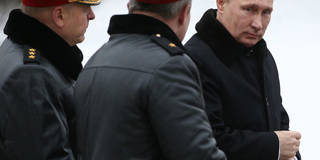During his campaign, US President-elect Donald Trump challenged the alliances and institutions that underpin the liberal world order, but he spelled out few specific policies. Perhaps the most important question raised by his victory is whether the long phase of globalization that began at the end of World War II is essentially over.
CAMBRIDGE – During his campaign, US President-elect Donald Trump questioned the alliances and institutions that undergird the liberal world order, but he spelled out few specific policies. Perhaps the most important question raised by his victory is whether the long phase of globalization that began at the end of World War II is essentially over.
Not necessarily. Even if trade agreements like the Trans-Pacific Partnership and the Transatlantic Trade and Investment Partnership fail and economic globalization slows, technology is promoting ecological, political, and social globalization in the form of climate change, transnational terrorism, and migration – whether Trump likes it or not. World order is more than just economics, and the United States remains central to it.
Americans frequently misunderstand our place in the world. We oscillate between triumphalism and declinism. After the Soviets launched Sputnik in 1957, we believed we were in decline. In the 1980s, we thought the Japanese were ten feet tall. In the aftermath of the Great Recession of 2008, many Americans mistakenly believed that China had become more powerful than the United States.

CAMBRIDGE – During his campaign, US President-elect Donald Trump questioned the alliances and institutions that undergird the liberal world order, but he spelled out few specific policies. Perhaps the most important question raised by his victory is whether the long phase of globalization that began at the end of World War II is essentially over.
Not necessarily. Even if trade agreements like the Trans-Pacific Partnership and the Transatlantic Trade and Investment Partnership fail and economic globalization slows, technology is promoting ecological, political, and social globalization in the form of climate change, transnational terrorism, and migration – whether Trump likes it or not. World order is more than just economics, and the United States remains central to it.
Americans frequently misunderstand our place in the world. We oscillate between triumphalism and declinism. After the Soviets launched Sputnik in 1957, we believed we were in decline. In the 1980s, we thought the Japanese were ten feet tall. In the aftermath of the Great Recession of 2008, many Americans mistakenly believed that China had become more powerful than the United States.